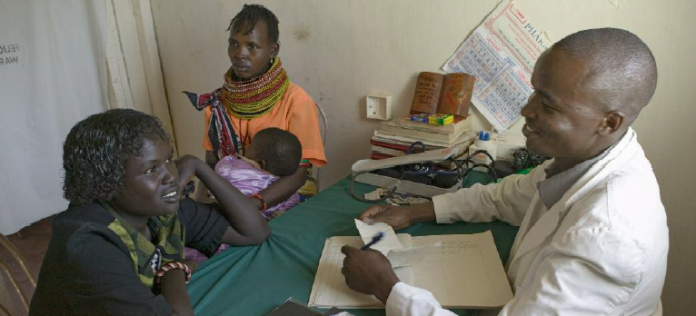
The efforts of the WHO Regional Office for Africa in tackling HIV in the African Region are detailed here, which is part of the organisation’s wider aim to improve the health and well-being of people
WHO Regional Office for Africa serves the WHO African Region, which is made up of 47
Member States with the Regional Office in Brazzaville, Republic of Congo. It is one of the World Health Organization’s (WHO) six regional offices around the globe. As the lead health authority within the United Nations (UN) system, they work with the Member States and development partners to improve the health and well-being of people.
Their main focus areas include health sector development, combatting diseases – infectious diseases, such as HIV and tuberculosis (TB), plus non-infectious diseases like diabetes, cancer and heart disease. In addition, WHO Regional Office for Africa prepares for
and rapidly respond to emergencies and disasters, plus they assist mothers and children to survive and thrive so they can enjoy reaching a healthy old age. In addition, WHO staff have a shared belief that all people are entitled to good quality affordable health care without falling into poverty. (1)
HIV in the African Region: “Know your status”
On 1st December 2018, the world community marked the 30th anniversary of World AIDS Day. 2018’s theme is “Know your status”. In the view of Regional Office for Africa, HIV testing empowers people to make choices about HIV prevention and exactly how to protect themselves and their loved ones.
The 1st December 2018 was also a chance to celebrate the 30th anniversary of World AIDS Day – a global health campaign initiated by WHO back in 1988. The WHO Regional Office for Africa marked that milestone with stories of people who have been living with HIV for a
very long time. One comment came from an activist in Congo, Thierry Maba, who said: “We must eliminate discrimination so that everyone can access HIV services.” Another came from a musician in Uganda, Moses Nsubuga who said: “It is very important to know your status. There is life after testing.” Many thought they would never live to see today.
WHO’s Regional Director for Africa, Dr Matshidiso Moeti gave a message on World AIDS Day 2018, where she said that the only way to determine a person’s HIV status is for them to have a test in order for them to know their status. She also offered her thoughts on HIV testing, life-saving antiretroviral therapy and work taking place to accelerate the expansion of HIV testing programmes.
“HIV testing is essential in expanding treatment and ensuring that all people living with HIV can lead healthy and productive lives. It is also crucial in ensuring that 90% of people living with HIV know their HIV status; 90% of people diagnosed with HIV receive antiretroviral therapy; and 90% of people living with HIV, and who are on treatment, achieve viral load suppression. HIV testing empowers people to make choices about HIV prevention specifically how to protect themselves and their loved ones.
“Significant progress has been made in the AIDS response since 1988, and today four in five (20.8 million) people living with HIV in the African Region know their status. In addition, more than three in five (15.3 million) people are accessing life-saving antiretroviral therapy. There is a more than 30% reduction in AIDS related deaths since 2010 and people living with HIV are leading longer, healthier lives thanks to the sustained access to antiretroviral therapy.
“However, this progress is not uniform in our Region. For example, in West and Central Africa, only one in two (2.9 million) people living with HIV know their status. That is why WHO, partners and Member States in the sub-region are working together to accelerate
the expansion of HIV testing programmes in order to reach people living with HIV who do not know their status and ensuring that they are linked to quality and prevention services.”
Dr Matshidiso Moeti then explained that many, including adult men and young people, are being left behind and others still only get tested after becoming ill. She added that stigma and discrimination still deter people from taking a test and said that access to confidential HIV testing is still a cause of concern. The ones who are left behind are those most affected by HIV, including sex workers, people who use drugs and men who have sex with men and prisoners. In her message, she went on to detail her thoughts on WHO’s plans for expanding HIV testing, prevention and treatment in the future. This note of optimism is a good place for this article to conclude.
“As part of the new 5-year strategy for WHO, we are working with Member States in the African Region to strengthen their health systems and help them progress towards universal health coverage, so that all people have access to the services they need, without
facing financial hardship. Universal health coverage offers an opportunity to expand HIV testing, prevention and treatment that is integrated with other programmes and services such as TB, and sexual and reproductive health.
“I call on countries to use the new HIV testing strategies and to choose a strategic mix of service delivery models to achieve universal and equitable access to HIV testing and counselling. We need to expand community-based options and innovations to reach
beyond health facilities. We also have to build strong linkages to guarantee HIV prevention, care and treatment services after testing. In all this we need the political will; we need the investment from governments, partners and private sectors, and most of all, we need the communities to promote demand for HIV testing services.” (2)
For more information on why the HIV epidemic is not over.
References
1 http://www.afro.who.int/about-us/en
2 https://afro.who.int/media-centre/events/world-aids-day-2018
Open Access Government
editorial@openaccessgovernment.org
www.openaccessgovernment.org
www.twitter.com/OpenAccessGov










